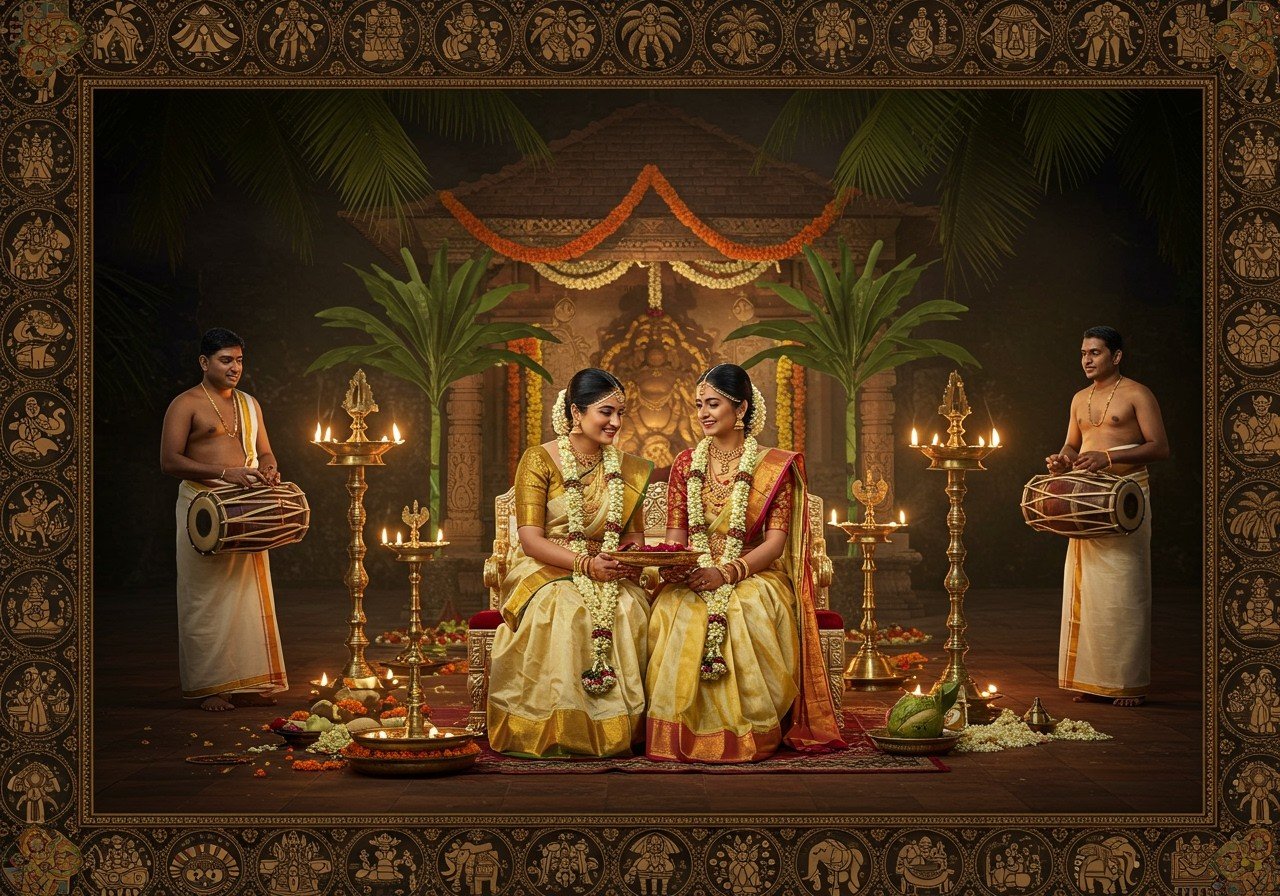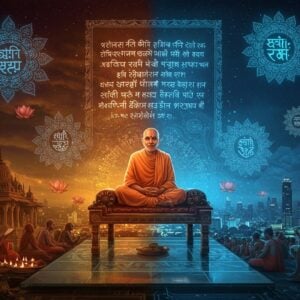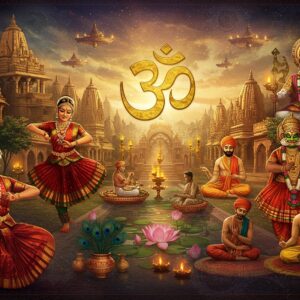
Delving into the heart of Kerala’s cultural tapestry reveals the vibrant traditions of Ezhava weddings. The Ezhava community, a prominent Hindu group in Kerala, cherishes its unique customs. In our ever-evolving world, preserving these traditions while embracing modern life is truly special. Join us as we explore the harmonious blend of tradition and modernity in Ezhava weddings, where cultural richness meets contemporary relevance. You can find everything you need for a traditional Kerala wedding at Poojn.in’s Wedding Items collection.
Pre-Wedding Rituals: Setting the Stage for a Blessed Union
Pre-wedding rituals hold immense significance in Ezhava weddings. They pave the way for the sacred union, creating an atmosphere of anticipation and joy. These customs, passed down through generations, reflect the community’s deep-rooted values and beliefs.
- Nischayam (Engagement): This beautiful ceremony formalizes the relationship, bringing the two families together. Gifts are exchanged, symbolizing mutual respect and acceptance, with elders and priests offering guidance and blessings. It marks a sacred beginning, full of hope and promise for the couple’s future.
- Paranjoonu or Virunnu (Engagement Feast): This joyous occasion is the official engagement ceremony. Elders from both families gather to formally announce the wedding date and share a delicious feast. Traditionally, the bride and groom might not have been present, but modern Ezhava engagements often include the couple, adding a touch of contemporary charm.
- Mothiram Maatal (Ring Exchange): Within the Paranjoonu ceremony, the couple exchanges rings, a symbol of their commitment and love. This act signifies the beginning of their journey together, a promise of shared dreams and a future intertwined.
- Horoscope Matching (Muhurtham): Finding the perfect, auspicious wedding date is paramount. Families consult horoscopes to select a ‘Muhurtham’ that is believed to bring good fortune to the couple. The matched horoscopes are sometimes tied together, symbolizing the intertwining of their destinies.
- Blessings (Aashirwadam): Elders shower the couple with blessings (Aashirwadam), invoking happiness, prosperity, and a lifetime of togetherness. Their wisdom and love infuse the ceremony with a sense of sacredness and continuity.
- Madhuramveppu (Sweet Welcome): On the wedding day, the groom is greeted with a sweet treat, known as ‘Madhuramveppu.’ This warm gesture symbolizes a sweet beginning to the marital journey, setting a tone of joy and celebration.
Need help with your wedding preparations? Explore Poojn.in’s Wedding Items collection to find everything you need, from traditional décor to auspicious items.
Wedding Day Rituals: A Tapestry of Sacred Traditions
The wedding day unfolds with a series of meaningful rituals, each carrying its own unique significance. From prayers to symbolic gestures, every moment is imbued with cultural richness and spiritual depth.
- Prayers: The day commences with prayers, invoking divine blessings upon the couple. The groom offers prayers to Lord Ganesha for a harmonious and prosperous marriage, while the bride may perform Gauri Puja at her home, seeking blessings from the Goddess for a fulfilling and joyful married life. Start your day with the right spiritual atmosphere by exploring our collection of Hawan Samagri and Kumkum and Roli.
- Kanyadaan: In this poignant ritual, the bride is brought to the Mandap, often in a beautifully decorated basket, symbolizing the transition from her parental home to her new life. This moment is filled with emotion, marking a significant turning point in her life’s journey. For a truly traditional Kanyadaan, consider our Baran Dala Chalons at Poojn.in.
- Thalikettu (The Main Ceremony): This is the heart of the Ezhava wedding ceremony. With heartfelt blessings and sacred mantras, the groom ties the Thali (a sacred necklace) around the bride’s neck, symbolizing the unbreakable bond of marriage. This sacred thread represents their commitment to a lifetime of togetherness.
- Malakal Charthal (Garland Exchange): The couple exchanges garlands, a symbol of their mutual acceptance and love. This vibrant exchange signifies the beginning of their shared journey, a promise to cherish and support each other.
- Kaikodukkal (Joining Hands): The couple holds hands, signifying their unity and togetherness. This simple yet profound gesture represents the beginning of their partnership, a promise to walk hand in hand through life’s joys and challenges.
- Pudamuri (Gifting of Cloth): The groom gifts the bride a new cloth, signifying his responsibility to care for her and provide for her well-being. This act represents his commitment to cherish and protect her throughout their married life.
- Circumambulation: The couple circles the consecrated Mandap three times, or sometimes a holy fire seven times (Saptapadi), reciting vows and solidifying their commitment. This act symbolizes their journey together, a promise to navigate life’s paths as one.
- Namaskaram (Greetings): The bride and groom greet their guests with respect and gratitude, acknowledging their presence and blessings. This heartfelt gesture reflects their appreciation for the support and love surrounding them.
- Sadya (Feast): A grand vegetarian feast, the Sadya, is served on banana leaves, symbolizing abundance and prosperity. This traditional Kerala feast is a celebration of flavors, bringing together family and friends to share in the joy of the occasion.
Community and Simplicity: The Essence of Ezhava Weddings
Ezhava weddings, while generally simpler than some other Hindu weddings in Kerala, are deeply rooted in cultural significance. They emphasize community connection, fostering family bonds, and strengthening ties within the broader Ezhava community. The traditional Ezhava attire adds to the elegance and authenticity of these celebrations.
While specific customs may vary between families and regions, the core rituals described above remain central to Ezhava weddings. Some practices like Kashi Yatra and Ayana blessings, while not universally practiced, showcase the diversity within the community’s traditions. It’s also important to note that certain historical practices, like “Thali kettu kalyanam,” a mock marriage ceremony before puberty once prevalent among some wealthier Ezhavas, were strongly opposed by social reformers like Sree Narayana Guru.
Poojn.in: Your Companion for Authentic Ezhava Wedding Rituals
Poojn.in understands the significance of every ritual in an Ezhava wedding. We offer a wide selection of authentic items, ensuring that every detail of your special day is steeped in tradition. From Thali sets to ritual kits, you’ll find everything you need right here. Browse our collection and experience the convenience of online shopping for your sacred needs.
For personalized guidance, reach out to us via phone at 03369029784 or WhatsApp at 9476142738. We’re always happy to assist you in finding the perfect items for your Ezhava wedding. Our pan-India delivery ensures that you receive your chosen items with ease and convenience. Learn more about the power of rituals and ceremonies in our blog post, The Power of Yoga, Meditation, and Ayurveda: Ancient Hindu Practices.
Embracing Tradition with Modern Convenience
Ezhava weddings are a testament to the enduring power of tradition in a modern world. They offer a glimpse into a community that values its heritage while adapting to contemporary life. At Poojn.in, we make it easier than ever to honor these traditions with our curated collection of authentic ritual items. Explore our offerings and discover the convenience of online shopping for all your sacred needs.
Interested in learning more about Kerala’s rich culture? Read our blog post on Kerala’s Sacred Foods, Sattvic Cuisine, and Temple Rituals. Also, find inspiration in the significance of Rangoli designs in our blog post, Hindu Wedding Traditions: Rangoli Designs and Their Significance. And for those interested in visiting a significant temple in Kerala, our Guruvayur Temple: A Complete Guide to History, Significance, and Visits blog post is a must-read.
FAQs on Ezhava Wedding Traditions
What is the typical duration of an Ezhava wedding? Ezhava weddings, known for their relative simplicity, are often one-day affairs, though celebrations can extend depending on family preferences.
What are the core ceremonies in an Ezhava wedding? The core ceremonies include Nischayam (engagement), Thalikettu (tying the Thali), and the wedding feast (Sadya). These are the essential elements that define an Ezhava wedding.
What is the significance of the Muhurtham? The Muhurtham is the auspicious time chosen for the wedding, carefully selected through astrological consultations to ensure a blessed and harmonious start to the couple’s married life.
Are there pre-wedding rituals in Ezhava marriages? Yes, pre-wedding rituals like Nischayam (engagement), Paranjoonu (engagement feast), and Madhuramveppu (sweet welcome for the groom) are integral parts of the wedding celebrations.
What is the traditional attire? Traditional Ezhava garments are worn, often reflecting regional variations. The bride usually wears a saree, while the groom typically wears a dhoti and shirt.
Is music a part of the ceremonies? Music and traditional songs play a vital role in Ezhava weddings, adding to the festive atmosphere and creating a joyous ambience.
What kind of food is served? A traditional vegetarian feast known as the Sadya is a highlight of Ezhava weddings. Served on banana leaves, it includes a variety of delicious Kerala dishes.


